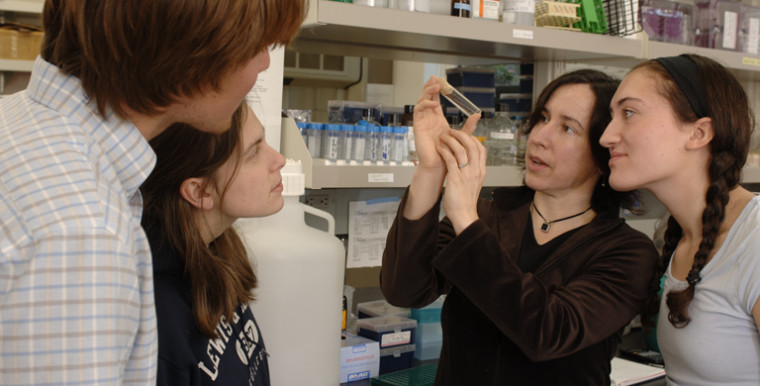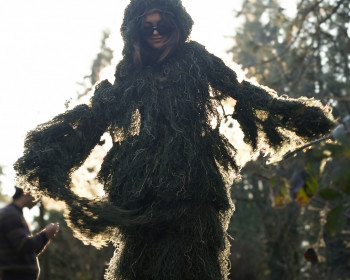Exceptional Educators
Open gallery

Last fall, U.S. News & World Report ranked Lewis & Clark 15th in the nation for liberal arts colleges with the best undergraduate teaching. While the accolades were appreciated, the news came as no surprise—our educators have long been known for their innovative teaching and ongoing commitment to faculty-student collaboration.
The latest in a string of awards highlighting Lewis & Clark’s commitment to excellence in teaching came in November 2011, when Greta Binford was selected as the 2011 Oregon Professor of the Year by the Council for Advancement and Support of Education (CASE) and the Carnegie Foundation for the Advancement of Teaching. Prior to that, Associate Professor of Psychology Jerusha Detweiler-Bedell received the Outstanding Baccalaureate Colleges Professor of the Year Award from CASE/Carnegie, and last fall two alumni garnered attention for outstanding teaching. Learn more about our exceptional educators below.
Greta Binford
Students and spiders: together this unlikely duo fuels Greta Binford’s passion for teaching, and her gifts as an educator have not gone unnoticed. She was recently named the 2011 Oregon Professor of the Year by CASE/Carnegie.
Since joining Lewis & Clark’s faculty in 2003, Binford, associate professor of biology, has immersed her students in scientific inquiry and encouraged them to learn about themselves while studying other species. Using spider diversity research as an entry point, she fosters undergraduate exploration of issues surrounding science, evolution, biodiversity, and biodiversity loss.
Andrew Wood ’11, Binford’s research assistant, helped her collect spiders in Texas and plans to study biology in graduate school. “As a teacher, she is extremely hands-on,” Wood said. “Her goal is to get you to learn to teach yourself with her mentorship, and she is phenomenal at that.”
Read more: 2011’s Top Teacher
Jerusha Detweiler-Bedell
The magic of Jerusha Detweiler-Bedell’s teaching style, which is well known among her loyal following of students at Lewis & Clark, has also been the focus of national acclaim. A few years ago, she was named the Outstanding Baccalauereate Colleges Professor of the Year by CASE/Carnegie.
Detweiler-Bedell, who joined the psychology faculty in 2001, immerses students in interactive and challenging lessons starting in their first psychology course. Students in her Introduction to Psychology class, for example, handle a human brain and imagine themselves as subjects in classic psychology experiments. More advanced students in her Clinical Psychology course assume the roles of therapist and patient as they learn to solve realistic problems.
When she accepted the prestigious award, Detweiler-Bedell said her goal in the classroom is to “transform each of my students from bystander to participant to collaborator, leading them not to just observe, but to engage–and not to just engage but to create.”
Read more: Transformative Teaching
Elena Garcia-Velasco
Last fall, Elena Garcia-Velasco MAT ’97, a Spanish teacher at Portland’s Roosevelt High School, received the state’s highest honor for teaching—the 2011-12 Oregon Teacher of the Year award. Since 1995, six Lewis & Clark alumni have received this honor.
According to an article in The Oregonian, Garcia-Velasco’s father, a lawyer for Spain’s education ministry, suggested that she pick the top graduate program when she was looking to get a teaching credential. She enrolled at Lewis & Clark Graduate School of Education and Counseling and, years later, still remembers what her professors said on her first day.
“They told us, ‘Teaching is the most important job in the world. We want you to be agents of transformation,’” Garcia-Velasco said. “Working at Roosevelt, you get to breathe that.”
Maureen Daschel
In October, Maureen Daschel MAT ’87 was named Outstanding Classroom Teacher by the Oregon Science Teachers Association. Dashel currently chairs the St. Mary’s Academy science department, where she leads two of the school’s most innovative science programs.
“I have a twofold obligation,” Daschel told The Columbian. “One is an obligation to kids who want to go on in science, that they are familiar with science fundamentals and processes. The other is to kids who aren’t going to go on in science but who, in an increasingly science- and technology-focused world, need to know how to think critically and need to have the confidence to question the experts.”
This story was originally published on January 25, 2012.
More Newsroom Stories
Public Relations is located in McAfee on the Undergraduate Campus.
MSC: 19
email public@lclark.edu
voice 503-768-7970
Public Relations
Lewis & Clark
615 S. Palatine Hill Road MSC 19
Portland OR 97219

